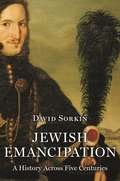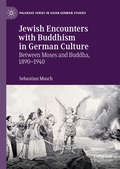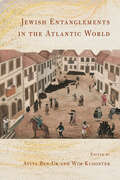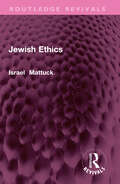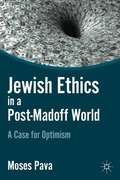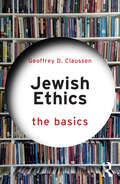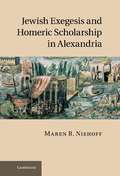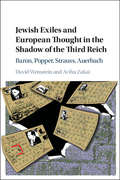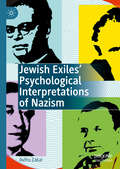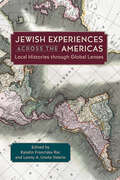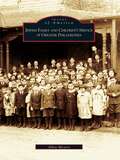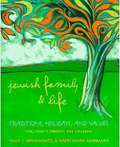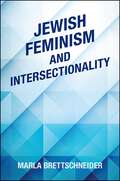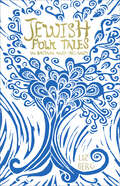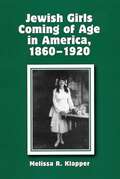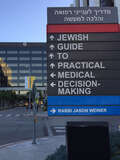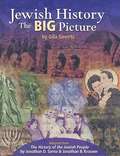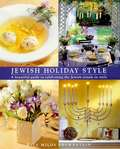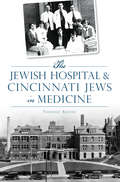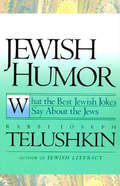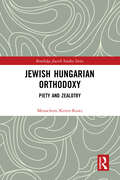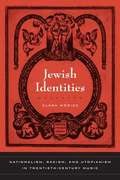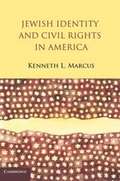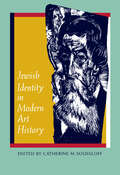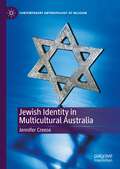- Table View
- List View
Jewish Emancipation: A History Across Five Centuries
by David SorkinThe first comprehensive history of how Jews became citizens in the modern worldFor all their unquestionable importance, the Holocaust and the founding of the State of Israel now loom so large in modern Jewish history that we have mostly lost sight of the fact that they are only part of—and indeed reactions to—the central event of that history: emancipation. In this book, David Sorkin seeks to reorient Jewish history by offering the first comprehensive account in any language of the process by which Jews became citizens with civil and political rights in the modern world. Ranging from the mid-sixteenth century to the beginning of the twenty-first, Jewish Emancipation tells the ongoing story of how Jews have gained, kept, lost, and recovered rights in Europe, North Africa, the Middle East, the United States, and Israel.Emancipation, Sorkin shows, was not a one-time or linear event that began with the Enlightenment or French Revolution and culminated with Jews' acquisition of rights in Central Europe in 1867–71 or Russia in 1917. Rather, emancipation was and is a complex, multidirectional, and ambiguous process characterized by deflections and reversals, defeats and successes, triumphs and tragedies. For example, American Jews mobilized twice for emancipation: in the nineteenth century for political rights, and in the twentieth for lost civil rights. Similarly, Israel itself has struggled from the start to institute equality among its heterogeneous citizens.By telling the story of this foundational but neglected event, Jewish Emancipation reveals the lost contours of Jewish history over the past half millennium.
Jewish Encounters with Buddhism in German Culture: Between Moses and Buddha, 1890–1940 (Palgrave Series in Asian German Studies)
by Sebastian MuschIn Germany at the turn of the century, Buddhism transformed from an obscure topic, of interest to only a few misfit scholars, into a cultural phenomenon. Many of the foremost authors of the period were profoundly influenced by this rapid rise of Buddhism—among them, some of the best-known names in the German-Jewish canon. Sebastian Musch excavates this neglected dimension of German-Jewish identity, drawing on philosophical treatises, novels, essays, diaries, and letters to trace the history of Jewish-Buddhist encounters up to the start of the Second World War. Franz Rosenzweig, Martin Buber, Leo Baeck, Theodor Lessing, Jakob Wassermann, Walter Hasenclever, and Lion Feuchtwanger are featured alongside other, lesser known figures like Paul Cohen-Portheim and Walter Tausk. As Musch shows, when these thinkers wrote about Buddhism, they were also negotiating their own Jewishness.
Jewish Entanglements in the Atlantic World
Jewish Entanglements in the Atlantic World represents the first collective attempt to reframe the study of colonial and early American Jewry within the context of Atlantic History. From roughly 1500 to 1830, the Atlantic World was a tightly intertwined swathe of global powers that included Europe, Africa, North and South America, and the Caribbean. How, when, and where do Jews figure in this important chapter of history? This book explores these questions and many others. The essays of this volume foreground the connectivity between Jews and other population groups in the realms of empire, trade, and slavery, taking readers from the shores of Caribbean islands to various outposts of the Dutch, English, Spanish, and Portuguese empires.Jewish Entanglements in the Atlantic World revolutionizes the study of Jews in early American history, forging connections and breaking down artificial academic divisions so as to start writing the history of an Atlantic world influenced strongly by the culture, economy, politics, religion, society, and sexual relations of Jewish people.
Jewish Ethics (Routledge Revivals)
by Israel I. MattuckFirst published in 1953 Jewish Ethics presents a systematic account of ethics in Judaism. The main sources for a study of Jewish ethics are the Bible and Talmud. Rabbi Israel Mattuck discusses themes like theory of Jewish ethics; man and his moral freedom; ethical element in messianism; guides to righteousness; justice and love; truth and peace; social ethics; the judgment on war; ideas of marriage, family and divorce; and asceticism and the good life, without getting into comparisons between ethics of Judaism and of other religions. This compact book is a must read for scholars of Judaism, religion, and history of Judaism.
Jewish Ethics in a Post-Madoff World
by Moses PavaMoses Pava explores new and alternative ways of relating to Jewish texts and concepts. In doing so, he invents a nuanced, flexible, and sufficiently sensitive vocabulary to conduct productive ethical dialogues, both within and between communities.
Jewish Ethics: The Basics (The Basics)
by Geoffrey D. ClaussenJewish Ethics: The Basics demonstrates how ancient and contemporary ideas have shaped and reshaped Jewish traditions about how to act toward others. Readers are introduced to foundational questions, controversies, and diverse ethical conclusions developed by Jewish thinkers throughout the ages. Topics addressed include:• Assumptions about Authority• Love, Compassion, Justice and Humility• Human Rights, War, Land and Power • Gender and Sexuality• Personal and Social Ethics• Environmental and Animal Ethics• Bioethical Issues Concise, readable and engaging, this is the ideal introduction for anyone interested in religious ethics, secular traditions, Judaism, and the field of Jewish ethics.
Jewish Exegesis and Homeric Scholarship in Alexandria
by Maren R. NiehoffSystematically reading Jewish exegesis in light of Homeric scholarship, this book argues that more than 2000 years ago Alexandrian Jews developed critical and literary methods of Bible interpretation which are still extremely relevant today. Maren Niehoff provides a detailed analysis of Alexandrian Bible interpretation, from the second century BCE through newly discovered fragments to the exegetical work done by Philo. Niehoff shows that Alexandrian Jews responded in a great variety of ways to the Homeric scholarship developed at the Museum. Some Jewish scholars used the methods of their Greek colleagues to investigate whether their Scripture contained myths shared by other nations, while others insisted that significant differences existed between Judaism and other cultures. This book is vital for any student of ancient Judaism, early Christianity and Hellenistic culture.
Jewish Exiles and European Thought in the Shadow of the Third Reich: Baron, Popper, Strauss, Auerbach
by Avihu Zakai David WeinsteinHans Baron, Karl Popper, Leo Strauss and Erich Auerbach were among the many German-speaking Jewish intellectuals who fled Continental Europe with the rise of Nazism in the 1930s. Their scholarship, though not normally considered together, is studied here to demonstrate how, despite their different disciplines and distinctive modes of working, they responded polemically in the guise of traditional scholarship to their shared trauma. For each, the political calamity of European fascism was a profound intellectual crisis, requiring an intellectual response which Weinstein and Zakai now contextualize, ideologically and politically. They exemplify just how extensively, and sometimes how subtly, 1930s and 1940s scholarship was used not only to explain, but to fight the political evils that had infected modernity, victimizing so many. An original perspective on a popular area of research, this book draws upon a mass of secondary literature to provide an innovative and valuable contribution to twentieth-century intellectual history.
Jewish Exiles’ Psychological Interpretations of Nazism
by Avihu ZakaiThis book examines works of four German-Jewish scholars who, in their places of exile, sought to probe the pathology of the Nazi mind: Wilhelm Reich’s The Mass Psychology of Fascism (1933), Erich Fromm’s Escape from Freedom (1941), Siegfried Kracauer’s From Caligari to Hitler: A Psychological History of the German Film (1947), and Erich Neumann’s Depth Psychology and a New Ethic (1949). While scholars have examined these authors’ individual legacies, no comparative analysis of their shared concerns has yet been undertaken, nor have the content and form of their psychological inquiries into Nazism been seriously and systematically analyzed. Yet, the sense of urgency in their works calls for attention. They all took up their pens to counter Nazi barbarism, believing, like the English jurist and judge Sir William Blackstone, who wrote in 1753 - scribere est agere ("to write is to act").
Jewish Experiences across the Americas: Local Histories through Global Lenses
by Katalin Franciska Rac Lenny A. Ureña ValerioLatin American Jewish Studies Association Best Edited VolumeThis volume explores the local specificities and global forces that shaped Jewish experiences in the Americas across five centuries. Featuring a range of case studies by scholars from the United States, Brazil, Europe, and Israel, it explores the culturally, religiously, and politically diverse lives of Jewish minorities in the Western Hemisphere.The chapters are organized chronologically and trace four global forces: the western expansion of early modern European empires, Jewish networks across and beyond empires, migration, and Jewish activism and participation in international ideological movements. The volume weaves together into one narrative the histories of communities and individuals separated by time and space, such as the descendants of Portuguese converts, Moroccan immigrants to Brazil, and U.S.-based creators of Yiddish movies.Through its transnational focus and close attention paid to local circumstances, this volume offers new insights into the multicultural pasts of the Americas’ Jewish populations and of the different regions that make up North, Central, and South America.Contributors: Lenny A. Ureña Valerio | Elisa Kriza | Raanan Rein | Adriana M. Brodsky | Lucas de Mattos Moura Fernandes | Katalin Franciska Rac | Zachary M Baker | Neil Weijer | Hilit Surowitz-Israel | Isabel Rosa Gritti | Tamar Herzog | Jose C Moya | Sandra McGee Deutsch | Dana RabinPublication of this work made possible by a Sustaining the Humanities through the American Rescue Plan grant from the National Endowment for the Humanities.
Jewish Family and Children's Service of Greater Philadelphia (Images of America)
by Allen MeyersJewish Family and Children's Service of Greater Philadelphia (JFCS) resulted from the merger of two important human service organizations in 1983: the Association for Jewish Children of Philadelphia and Jewish Family Service of Philadelphia. Helping one in four Jewish households in crisis and in need as well as thousands of others, JFCS plays a primary role in the Greater Philadelphia community. The earliest predecessor of JFCS, the Jewish Foster Home, opened in 1855 with five children in its care. Established through the leadership of Rebecca Gratz, the foremost American Jewish female leader of her day, it was the nation's first Jewish orphanage and heralded a record of compassion, skill, and innovation in community services. Today, JFCS reaches out to more than 41,000 individuals and families each year with a wide array of programs from adoption to senior services. Jewish Family and Children's Service of Greater Philadelphia is the first illustrated history of this organization. With numerous historic photographs, including images from the 150th anniversary celebration in 2005, this book touches on all aspects of the organization's history: services, programs, staff, and fund-raising.
Jewish Family and Life: Traditions, Holidays and Values for Today's Parents and Children
by Yosef I. Abramowitz Susan SilvermanJewish Family and Life: Traditions, Holidays, and Values for Today's Parents and Children has become the definitive book for parents to turn to for sound advice on important and current parenting issues. It dispenses invaluable information that is relevant to Jewish families today, whether the family has a mixed marriage, two parents, a single parent, or adoptive parents. The book's three parts--Traditions, Holidays and Values--investigate contemporary issues in raising children and show concrete ways in which Judaism can play a practical role in enriching a family's spiritual and moral education. Each chapter includes lively, hands-on activities that you can do with your kids and simultaneously instill vital cultural and religious education. Vetted by a prestigious advisory board that is co-chaired by Nobel Prize-winner Elie Weisel, this book with help unify the family and re-establish rich traditions that have been lost over the generations.
Jewish Feminism and Intersectionality (SUNY series in Feminist Criticism and Theory)
by Marla BrettschneiderJewish Feminism and Intersectionality explores a range of opportunities to apply and build intersectionality studies from within the life and work of Jewish feminism in the United States today. Marla Brettschneider builds on the best of what has been done in the field and offers a constructive internal critique. Working from a nonidentitarian paradigm, Brettschneider uses a Jewish critical lens to discuss the ways different politically salient identity signifiers cocreate and mutually constitute each other. She also includes analyses of matters of import in queer, critical race, and class-based feminist studies. This book is designed to demonstrate a range of ways that Jewish feminist work can operate with the full breadth of what intersectionality studies has to offer.
Jewish Folk Tales in Britain and Ireland (Folk Tales)
by Liz BergIn this book of folk tales, Liz Berg shares Jewish memories: authentic tales, songs and jokes told by Jews in Britain and Ireland. Some stories moved from place to place, changing and adapting to new landscapes and taking on different textures, but the core of the story stays the same and is preserved through oral storytelling and recorded on these pages. Here are tales from the time of Domitian’s Jewish slaves working in the tin mines of Cornwall, through to the tales being told in communities today, all incorporating the wit and magic of a rich and varied culture successfully integrated into Britain and Ireland.
Jewish Girls Coming of Age in America, 1860-1920
by Melissa R. KlapperJewish Girls Coming of Age in America, 1860—1920 draws on a wealth of archival material, much of which has never been published—or even read—to illuminate the ways in which Jewish girls’ adolescent experiences reflected larger issues relating to gender, ethnicity, religion, and education.Klapper explores the dual roles girls played as agents of acculturation and guardians of tradition. Their search for an identity as American girls that would not require the abandonment of Jewish tradition and culture mirrored the struggle of their families and communities for integration into American society.While focusing on their lives as girls, not the adults they would later become, Klapper draws on the papers of such figures as Henrietta Szold, founder of Hadassah; Edna Ferber, Pulitzer Prize-winning author of Showboat; and Marie Syrkin, literary critic and Zionist. Klapper also analyzes the diaries, memoirs, and letters of hundreds of other girls whose later lives and experiences have been lost to history.Told in an engaging style and filled with colorful quotes, the book brings to life a neglected group of fascinating historical figures during a pivotal moment in the development of gender roles, adolescence, and the modern American Jewish community.
Jewish Guide to Practical Medical Decision-Making
by Jason WeinerDue to the rapid advances in the medical field, existing books on Jewish medical ethics are quickly becoming outdated and irrelevant. Jewish Guide to Practical Medical Decision-Making seeks to remedy that by presenting the most contemporary medical information and rabbinic rulings in an accessible, user-friendly manner. Rabbi Weiner addresses a broad range of medical circumstances such as surrogacy and egg donation, assisted suicide, and end of life decision making. Based on his extensive training and practical familiarity inside a major hospital, Rabbi Weiner provides clear and concise guidance to facilitate complex decision-making for the most common medical dilemmas that arise in contemporary society.
Jewish History: The Big Picture
by Gila Gevirtz Jonathan B. KrasnerThis lively and accessible volume presents the full range of Jewish history, from biblical to contemporary times. Adapted from the two-volume award-winning work, The History of the Jewish People by Professors Jonathan Sarna and Jonathan Krasner, this single volume treats readers to a fast-paced account of Jewish history that is grounded in scholarship and brimming with information on topics as diverse as the development of Christianity beyond its Jewish roots into a new religion and the revival of Hebrew as a spoken language. The text is filled with colorful anecdotal detail about Jewish communities throughout history and around the world, such as how Passover was celebrated on the Civil War battlefield and the origins of Beta Israel, the Ethiopian-Jewish community.
Jewish Holiday Style
by Rita Milos BrownsteinAt last -- the Jewish holidays transformed into exquisite celebrations, graced with sublime chic and elegant ease for the contemporary Jewish reader. Combining the flair of Martha Stewart with the warmth and accessibility of a delightful neighbor, Rita Milos Brownstein breathes new life into traditional Jewish holiday celebrations. Entertaining in high style creates marvelous holiday memories for your family, your friends, and yourself. For each of the ten major holidays, Brownstein offers suggestions for creative projects that will bring the whole family together and mouth-watering menus that make it effortless to prepare festivities of true material and spiritual splendor. With more than 85 full-color photographs and easy-to-follow step-by-step illustrations, this captivating book will motivate you to explore your Jewish heritage and use your imagination to make it your own. Jewish Holiday Style is packed with dazzling and inspiring ideas. For Rosh Hashanah, host a honey-tasting party to celebrate the sweetness of a new year. If you love the ocean, observe Sukkot in a sukkah with a seaside motif -- even if you live in the cornfields of the Midwest. Make your own Chanukah menorahs -- try a simple cruse of oil that reflects the miracle of the oil in the Holy Temple, or an elaborate metalworked candelabra that is sure to become a family heirloom. For the Passover table, create personalized pillows for your guests, which.will allow them to recline like the royalty of old while you serve a lavish yet simple-to-prepare feast. As part of this eye-opening tour through the Jewish calendar, Brownstein also highlights the historical origins and religious importance of each major holiday with a delightful essay that brings ancient rituals into the modern day. Think of the fast of Yom Kippur, for instance, as "a day spa for the soul...the too rare opportunity to get in touch with the things that really matter." Purim is "the definitive holiday of joy and merriment," commemorating a bright moment in the often somber history of the Jewish people. On Shabbat, "appreciate that you are joining the wave of Jews who are kindling their candles as the sun falls, working its way around the world." At once a handbook of creative ideas and a primer on the spiritual significance of the Jewish holidays, Jewish Holiday Style is the first lifestyle book to address these all-important rituals and ceremonies, an elegantly designed volume that blends sensational crafts and delectable cooking with the richness of Judaism's 3,300-year-old tradition. Bursting with fresh ideas and exciting new looks, here, finally, is the book you've been waiting for. Let the holiday celebrations begin!
Jewish Hospital & Cincinnati Jews in Medicine, The (American Heritage)
by Frederic KromeCincinnati Jewish Hospital has remained a beacon of service to the city for more than a century and a half. Although it always accepted patients regardless of their heritage or faith, the institution maintains its Jewish identity. Founded in 1850, the Hospital weathered depressions and wars while reflecting changes that occurred within the Jewish community and the city. Cincinnati's Jewish health professionals pioneered medical education, new treatments for polio and the introduction of new psychological treatments for children. Author Frederic Krome explores the fascinating history of the Cincinnati Jewish Hospital and the many contributions Cincinnati Jews made to the field of medicine.
Jewish Humor
by Joseph TelushkinHere are more than 100 of the best Jewish jokes you'll ever hear, interspersed with perceptive and persuasive insight into what they can tell us about how Jews see themselves, their families, and their friends, and what they think about money, sex, and success. Rabbi Joseph Telushkin is as celebrated for his wit as for his scholarship, and in this immensely entertaining book, he displays both in equal measure. Stimulating, something stinging, and always very, very funny, Jewish Humor offers a classic portrait of the Jewish collective unconscious.
Jewish Hungarian Orthodoxy: Piety and Zealotry (Routledge Jewish Studies Series)
by Menachem Keren-KratzBeginning with the informal establishment of Jewish Orthodoxy by a Hungarian rabbi in the early nineteenth century, this book traces the history and legacy of Jewish Hungarian Orthodoxy over the course of the last 200 years. To date, no single book has provided a comprehensive overview of the history of Hungarian Orthodoxy, a singularly zealous, fundamental, and separatist faction within Jewish circles. This book describes and explains the impact of this strand of Jewish Orthodoxy – developed in Hungary in the second half of the nineteenth century – across the Jewish world. The author traces the development of Hungarian Orthodoxy in the “new” Jewish territories created in the wake of Hungary’s dismantlement following its defeat in World War I. The book also focuses on Hungarian Orthodoxy in the two spheres where it continued to develop after the Holocaust, namely Israel and the United States. The book concludes with a review of Hungarian Orthodoxy’s legacy in contemporary communities worldwide, most of which are known for their radical anti-Zionist and anti-modernistic strands. The book will prove vital reading for students and academics interested in religious fundamentalism, Hungarian history, and Jewish studies generally.
Jewish Identities: Nationalism, Racism, and Utopianism in Twentieth-Century Music
by Klara MoriczKlara Moricz scrutinizes concepts of Jewish identity and reorders ideas about twentieth-century "Jewish music" in three case studies: first, Russian Jewish composers of the first two decades of the twentieth century; second, the Swiss American Ernest Bloch; and third, Arnold Schoenberg.
Jewish Identity and Civil Rights in America
by Kenneth L. MarcusGiven jurisdiction over race and national origin but not religion, federal agents have had to determine whether Jewish Americans constitute a race or national origin group. They have been unable to do so. This has led to enforcement paralysis, as well as explosive internal confrontations and recriminations within the federal government. This book examines the legal and policy issues behind the ambiguity involved with civil rights protections for Jewish students. Written by a former senior government official, this book reveals the extent of this problem and presents a workable legal solution.
Jewish Identity in Modern Art History
by Catherine M. SoussloffIn the first comprehensive study of Jewish identity and its meaning for the history of art, eleven influential scholars illuminate the formative role of Jews as subjects of art historical discourse. At the same time, these essays introduce to art history an understanding of the place of cultural identity in the production of scholarship.Contributors explore the meaning of Jewishness to writers and artists alike through such topics as exile, iconoclasm, and anti-Semitism. Included are essays on Anselm Kiefer and Theodor Adorno; the effects of the Enlightenment; the rise of the nation-state; Nazi policies on art history; the criticism of Meyer Schapiro, Clement Greenberg, and Aby Warburg; the art of Judy Chicago, Eleanor Antin, and Morris Gottlieb; and Jewish patronage of German Expressionist art.Offering a new approach to the history of art in which the cultural identities of the makers and interpreters play a constitutive role, this collection begins an important and overdue dialogue that will have a significant impact on the fields of art history, Jewish studies, and cultural studies.
Jewish Identity in Multicultural Australia (Contemporary Anthropology of Religion)
by Jennifer CreeseThis book offers a timely insight into ideas of ‘belonging’ in multicultural society from a Jewish perspective, one which is largely missing from the discourse on multiculturalism. There is a current climate in Australia, as there is in the United States, Europe and elsewhere, of rising tensions around migration, religious freedom, and far right extremism. These tensions have been fanned the Israeli-Palestine conflict coming under increased international scrutiny in recent months. Understanding how Jewish communities attempt to build and guide an understanding of what Jewishness means in contemporary multicultural societies is crucial for supporting the right to safety in diversity, not only for Jews but for multiple minority groups. In delivering such understanding, this book has insights not only in an Australian, but a broader international, context.This book explores how various facets of Jewish life are experienced and expressed in Australia, drawing on rich ethnographic and archival research conducted within the mid-sized Jewish community in South-East Queensland, Australia, which has never before been examined. Jewish Identity in Multicultural Australia explores how Jewish identity is manifested and experienced across a wide range of facets: religion and religiosity, ethnicity and ethnonational identity, history and memory, antisemitism and racism, Zionism and diasporic identity, and family and kinship. Across these key themes, the book builds on a core argument: that contemporary Jewish communities work in certain, set ways and promote certain, set norms within a framework of state multiculturalism to forge a safe, supported place for Jewish life, practice and identity of all shapes and sizes.
